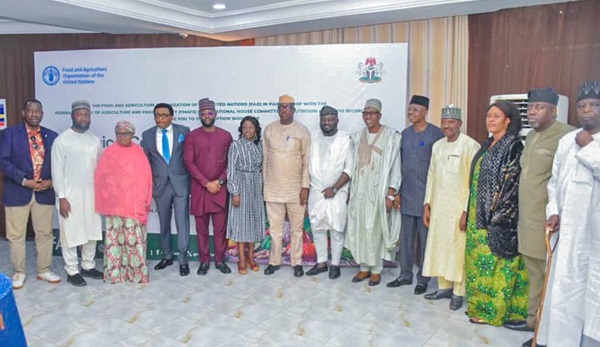
The Federal Ministry of Agriculture and Food Security, in partnership with the Food and Agriculture Organisation (FAO) and other key stakeholders, has convened a workshop to deliberate on the implementation of Project “Nourishing Nigeria” as part of efforts to combat malnutrition and food insecurity across the country.
At the inception workshop held recently in Abuja, the permanent secretary of the ministry, Dr. Marcus Ogunbiyi, represented by the director of agriculture lands and climate change management services, Oshadiya Olanipeku, explained that the project is a technical cooperation programme designed to review the Agriculture Sector Food and Nutrition Strategy (ASFSNS) and ensure its alignment with current national and international standards.
He highlighted that the initiative will establish Junior Farmer Field and Business Schools to equip young farmers at sub-national levels with both technical skills and entrepreneurial capacity. The project also seeks to develop a policy and legal framework that will effectively address malnutrition and food insecurity through sound governance and strategic interventions.
Ogunbiyi emphasised that nutrition-sensitive agriculture is crucial for addressing stunting, wasting and underweight issues by fostering awareness of healthy diets, improving value chains for nutritious foods and promoting diversified food production at the household level.
He stated that these efforts are in line with Nigeria’s food systems transformation agenda, which aims to enhance dietary diversity and ensure sustainable food security, thereby reducing malnutrition significantly.
The permanent secretary acknowledged that Nigeria faces a dual burden of malnutrition, combining undernutrition and overnutrition, both of which have serious public health implications. He pointed out that around 79 per cent of Nigerian households experience food insecurity, leading to harmful coping strategies such as reducing meal sizes or resorting to cheaper, less nutritious food options.
He added that this dire situation has intensified micronutrient deficiencies, with anaemia affecting 30.5 per cent of young children, 20.3 per cent of adolescent girls, 23.3 per cent of women of reproductive age and 31.5 per cent of pregnant women. In response, the ministry is promoting homestead gardening by providing vulnerable households with nutrition input packs to increase access to micronutrients through the consumption of bio-fortified crops, fruits and vegetables grown at home.
In his remarks, the director of food and nutrition safety, Nuhu Kilishi underscored the importance of adopting a multifaceted approach that brings together stakeholders from agriculture, health and other relevant sectors to tackle the persistently high rates of malnutrition in Nigeria.
The chairman of the House Committee on Food and Nutrition, Hon. John Okafor also addressed the gathering, stating that the initiative is timely and aligns with the committee’s core mandate to provide robust legislative backing to the executive arm of government in the fight against malnutrition and food insecurity.
In a presentation, the FAO country representative, Dominique Kouacou, represented by programme officer, Tofiq Braimag noted that the organisation, in collaboration with the ministry and the House Committee on Food and Nutrition, is launching the “Nourishing Nigeria” technical cooperation programme to tackle malnutrition and food insecurity by integrating nutrition-sensitive approaches into agricultural planning and policy development.
A statement from the ministry’s director of information, signed by Mabel Obe, confirmed that representatives from UNICEF, the World Food Programme, state commissioners of agriculture, permanent secretaries and other development partners attended the workshop.


